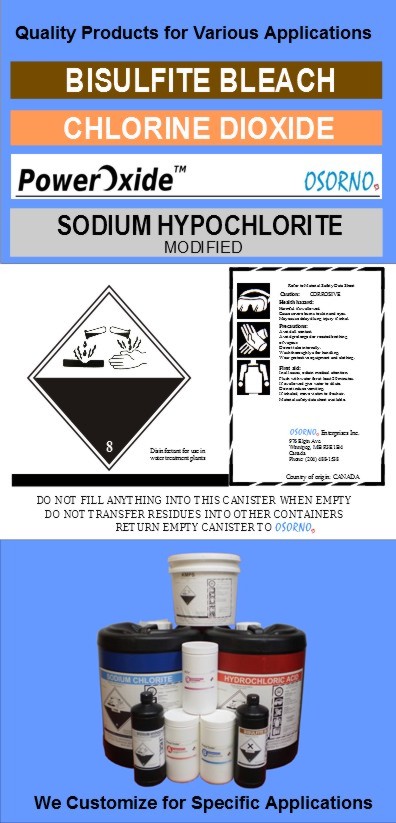
150 years ago, chlorine was the only option for treating drinking water. There are many more water disinfectants available today. This list includes ozone, hydrogen peroxide, chlorine dioxide, potassium monopersulfate (KMPS), and UV radiation. Each of these disinfectants has a different strength and are suitable for different applications. They are all effective at water disinfection and avoid some of the complications associated with chlorine.
Water disinfectants can also be used as oxidants. Oxidants remove unwanted components in water through oxidation. UV radiation, in particular, triggers oxidation by photolysis.
The strongest known oxidant in water treatment, hydroxyl radicals, are formed during UV light dissociation of hydrogen peroxide.
Chlorine dioxide is an advanced disinfectant for water and wastewater treatment. It also works well for disinfecting swimming pools. Unlike chlorine, chlorine dioxide does NOT produce carcinogenic compounds as a by-product of disinfection. Chlorine dioxide is better than regular chlorine for disinfecting drinking water. Another property of note for chlorine dioxide is that it has a long-lasting effect through residual concentration – something that neither ozone nor UV can provide.
Our liquid sets for chlorine dioxide production consist of Hydrochloric Acid 9% and Sodium Chlorite 7.5%. Both components are ANSI60 certified for drinking water. You can purchase these liquid sets from the Osorno Online Store and directly from our company.
The PowerOxide™ chlorine dioxide kit consists of two components used to produce chlorine dioxide. PowerOxide™ is often used when you cannot invest in a chlorine dioxide generator or when you only need to produce singular batches of chlorine dioxide. Both components are ANSI60 certified for drinking water. You can purchase PowerOxide™ disinfectant from the Osorno Online Store.
KMPS, potassium monopersulfate, (the K comes from “kalium”, the Latin word for potassium) in its stable form is a triple salt and a highly active oxidant. This chemical can be used for a wide range of applications, such as disinfecting drinking water, disinfecting wastewater lagoons prior to discharge, disinfecting swimming pools, or sanitizing water reservoirs (dugouts) for small communities. Potassium monopersulfate can be used with sodium or calcium hypochlorite. KMPS is ANSI60 certified for drinking water. You can purchase KMPS from the Osorno Online Store or directly from our company.
Hydrogen peroxide (perhaps best known for its use as hair bleach) is a slow-acting, but strong disinfectant. The oxidation potential of hydrogen peroxide even exceeds that of potassium permanganate. It is best used to oxidize organic matter in raw water, enabling easy removal through flocculation. Hydrogen peroxide can be used with chlorine dioxide (but not with chlorine or hypochlorite). You can purchase Hydrogen Peroxide from the Osorno Online Store in 4 L and 20 L containers.
The disinfection compound in sodium hypochlorite is hypochlorous acid. This acid forms when chlorine gas dissolves in water. You cannot isolate hypochlorous acid from sodium hypochlorite because it exists in equilibrium with its precursors. Furthermore this equilibrium depends on numerous factors. The disinfection efficiency of sodium hypochlorite depends on the water's pH. An acceptable pH for efficient disinfection is 6.8 – 7.5. Hypochlorous acid reacts with organic compounds and forms THMs (trihalomethanes).
In addition, hypochlorous acid reacts with ammonia to form chloramines, which are a weak secondary disinfectant. There are many different types of chloramines. Monochloramines form in a pH range of 7.5 - 9.0. The most acceptable pH for water chloramination is 8.2 – 8.3. You can purchase Sodium Hypochlorite 12% from the Osorno Online Store.
Sodium bisulfite (also known as bisulfite bleach or sodium hydrogen sulfite) is a reducing disinfectant. It is used to reduce residual chlorine in chlorinated water. Sodium bisulfite also reduces any residual concentrations of chlorine dioxide and hydrogen peroxide. Another trait of sodium bisulfite is that it can prevent oxidative corrosion. You can purchase our 32% sodium bisulfite solution from the Osorno Online Store.
Ozone (O3) is produced when oxygen (O2) is exposed to UV light. It is a powerful oxidant for treating water and air. Because ozone decays quickly, you cannot manufacture and transport ozone like you can with other industrial gases.
© Osorno Enterprises Inc.